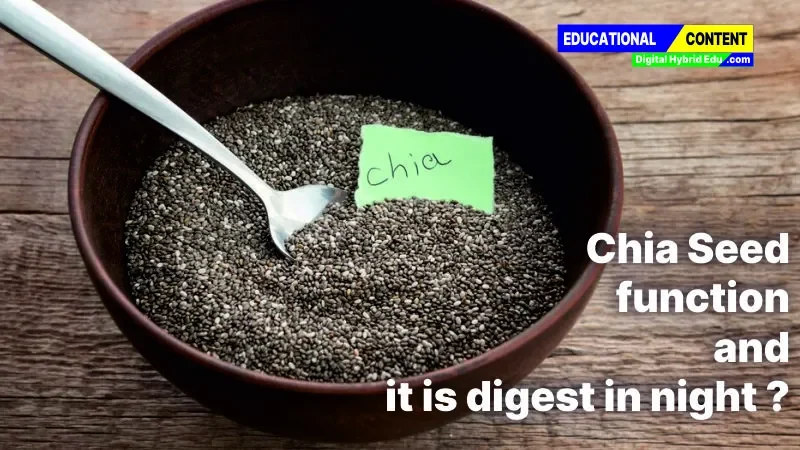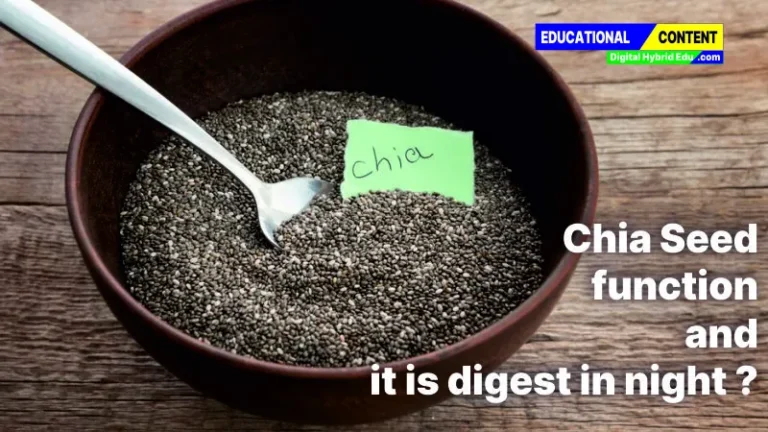Chia seeds are small, nutrient-dense seeds known for their numerous health benefits. When consumed, particularly in the form of chia seed water, they can significantly impact digestion and overall health.
Table of Contents
ToggleChia Seed: Functions and Benefits
Chia seeds are tiny, nutrient-dense seeds that offer several health benefits. They are rich in fiber, omega-3 fatty acids, protein, antioxidants, and a variety of essential vitamins and minerals. Here are some of the key functions and benefits of chia seeds:
1. High Fiber Content
- Chia seeds are packed with soluble fiber, which absorbs water and forms a gel-like substance in the digestive tract. This helps with:
- Improved digestion: Fiber promotes regular bowel movements, prevents constipation, and supports gut health.
- Satiety: The fiber expands when mixed with liquid, which can help you feel fuller for longer, potentially aiding in weight management.
- Blood sugar regulation: Soluble fiber slows the absorption of sugar into the bloodstream, preventing spikes in blood sugar levels.
2. Rich in Omega-3 Fatty Acids
- Chia seeds are one of the best plant-based sources of omega-3 fatty acids (ALA), which are essential for:
- Heart health: Omega-3s help reduce inflammation, lower cholesterol levels, and improve overall cardiovascular health.
- Brain function: Omega-3s support cognitive function and mental health.
3. Protein Source
- Chia seeds contain a good amount of plant-based protein, which is important for:
- Muscle repair and growth: Protein is essential for muscle development and recovery, especially for those who engage in regular exercise.
- Balanced nutrition: Chia seeds provide a complete source of protein, containing all nine essential amino acids.
4. Antioxidants
- Chia seeds are loaded with antioxidants, which help fight oxidative stress and reduce the risk of chronic diseases, such as heart disease and cancer.
5. Bone Health
- Chia seeds contain important nutrients like calcium, phosphorus, and magnesium, which are beneficial for maintaining strong bones and preventing osteoporosis.
Digestibility of Chia Seeds at Night
Chia seeds are generally easy to digest and can be consumed at any time of the day, including at night. However, the timing and preparation method can influence how well they are digested at night:
1. High Fiber Content and Digestion
- Soluble fiber: Chia seeds are rich in soluble fiber, which can slow down digestion by forming a gel-like substance when soaked in water or liquid. This property helps promote a gradual and steady release of energy, making them a good choice for a nighttime snack.
- Potential for bloating: For some people, the high fiber content may lead to bloating or gas if consumed in large amounts before bed, especially if they are not used to high-fiber foods. Drinking enough water with chia seeds is important to help them digest properly.
2. Hydration is Key
- Absorbs liquid: Chia seeds can absorb up to 10–12 times their weight in water. When soaked, they form a gel-like consistency that aids in digestion. Eating soaked chia seeds (e.g., in water, milk, or yogurt) is easier to digest than consuming them dry, especially at night when digestion slows down.
- Dry chia seeds: If consumed dry, chia seeds may absorb water from your digestive system, which could cause discomfort or constipation in some cases.
3. Benefits of Eating Chia Seeds at Night
- Sustained energy: Chia seeds provide a slow release of energy due to their combination of fiber, protein, and healthy fats, which can help prevent nighttime hunger and promote stable blood sugar levels.
- Improved sleep: Chia seeds contain tryptophan, an amino acid that helps produce serotonin and melatonin, which are crucial for regulating sleep.
4. How to Consume Chia Seeds at Night
- Soaked chia pudding: One of the best ways to consume chia seeds at night is to prepare chia pudding by soaking the seeds in milk, almond milk, or water for several hours (or overnight). This makes them easier to digest and provides a light but nutritious snack that can aid in digestion without causing discomfort.
- Smoothies or yogurt: You can also mix chia seeds into a nighttime smoothie or yogurt, letting them soak and expand, which ensures they are digested well.
5. Potential Drawbacks
- Bloating or discomfort: For some people, eating high-fiber foods like chia seeds close to bedtime may cause gas or bloating, particularly if their digestive system is sensitive or if they aren’t accustomed to fiber-rich foods.
- Hydration: Consuming dry chia seeds without enough liquid may cause discomfort as they absorb water in the stomach, potentially leading to bloating or indigestion.
Conclusion: Can Chia Seeds Be Digested at Night?
Yes, chia seeds can be consumed and digested at night, especially if they are soaked and eaten in moderation. They provide a slow release of energy, help maintain stable blood sugar levels, and even support sleep. However, it’s important to consume them with adequate water or other liquids to avoid potential digestive discomfort like bloating. For most people, chia seeds make a nutritious and easily digestible nighttime snack, especially in the form of chia pudding or mixed into yogurt.






